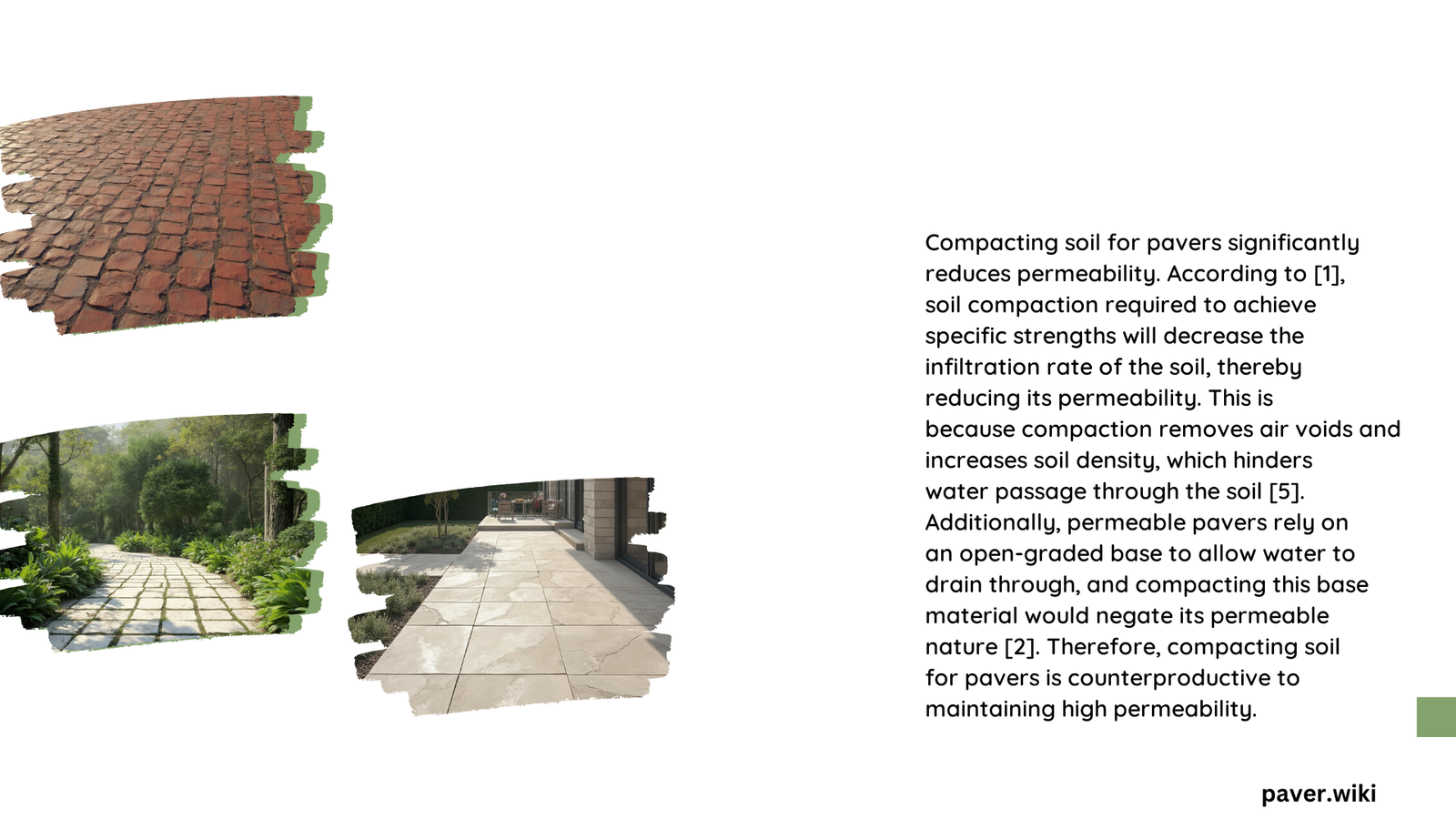Compacting soil for pavers significantly reduces permeability. This process increases soil density, decreasing pore spaces for water infiltration. Compacted soils, especially those with high clay content, can experience a substantial reduction in permeability, with infiltration rates potentially 10 to 100 times lower than uncompacted soils. This impact on soil structure affects drainage capabilities and overall paver system performance.
What is the Relationship Between Soil Compaction and Permeability?
Soil compaction for pavers has a direct impact on soil permeability. As the soil is compacted, its density increases, which in turn reduces the available pore spaces for water infiltration. This relationship is particularly pronounced in soils with high clay content.
- Compacted clay soils can have infiltration rates several orders of magnitude lower than uncompacted soils
- Studies show that compacted soils can have infiltration rates 10 to 100 times lower than uncompacted soils
- Pervious pavements over compacted clay soils may require greater subbase depth and underdrains to compensate for reduced infiltration rates
How Does Compaction Affect Soil Density and Permeability?

Compaction significantly increases soil density while reducing permeability. This change in soil structure has profound effects on its ability to absorb and transmit water.
| Soil Condition | Typical Density Range |
|---|---|
| Uncompacted | 1.2 to 1.6 g/cm³ |
| Compacted | 1.8 to 2.2 g/cm³ |
For optimal paver stability, the ideal soil density range is often between 1.9 and 2.1 g/cm³, although this can vary based on specific paver systems and soil conditions.
What is the Impact on Drainage Capabilities?
The increased soil density due to compaction significantly influences drainage rates by reducing the infiltration capacity of the soil.
- Compacted soils have lower infiltration rates compared to uncompacted soils
- In permeable paving systems, infiltration rates can drop from 10-20 inches per hour in uncompacted sandy soils to less than 1 inch per hour in compacted clay soils
- This reduction in infiltration rate can significantly impact the overall drainage performance of the paver system
What are the Challenges and Techniques in Achieving Effective Soil Compaction?
Achieving effective soil compaction for pavers involves careful selection of equipment and compaction methods. Here are some key considerations:
Equipment:
- Hand tampers
- Plate compactors
- Roller compactors
- Heavy-duty rollers (for larger areas)
Compaction Methods:
- Multiple passes with the compactor to achieve desired density
- Systematic approach to ensure uniform compaction across the entire area
Best Practices:
- Conduct a percolation test to assess soil infiltration capacity
- Prepare the subgrade with a slight slope for proper water direction
- Compact soil in layers to avoid over-compaction
- Use a mechanical compactor to level and interlock pavers into the setting bed
- Periodically check for clogging and clean the surface using a vacuum sweeper
What are the Associated Costs of Soil Compaction for Pavers?
The costs associated with soil compaction can vary depending on several factors:
- Equipment Rental: $100 to $500 per day for compactors, depending on type and size
- Labor: $50 to $150 per hour for skilled operators
- Maintenance: Regular cleaning and inspection of pavers (essential for maintaining permeability and stability)
How Can Permeability be Maintained in Compacted Soil for Pavers?
While compaction reduces permeability, there are strategies to maintain some level of water infiltration:
- Use of Permeable Pavers: These specially designed pavers allow water to pass through or between them.
- Proper Base Material: Utilize a base of crushed stone or similar material that allows water to drain.
- Adequate Drainage Systems: Implement underdrains or other drainage solutions to manage water that can’t infiltrate.
- Regular Maintenance: Periodic cleaning and inspection to prevent clogging of permeable surfaces.
What are the Long-term Effects of Soil Compaction on Paver Systems?
The long-term effects of soil compaction on paver systems can be significant:
- Reduced Water Infiltration: Over time, compacted soil continues to resist water penetration, potentially leading to surface runoff issues.
- Stability vs. Permeability Trade-off: While compaction increases stability, it decreases permeability, requiring a balance for optimal performance.
- Potential for Settling: Unevenly compacted areas may lead to settling of pavers over time.
- Maintenance Requirements: Compacted systems may require more frequent maintenance to maintain any remaining permeability.
In conclusion, while compacting soil for pavers does significantly reduce permeability, proper planning, installation techniques, and ongoing maintenance can help mitigate these effects and ensure a functional paver system.
References:
1. EPA – Stormwater Best Management Practice, Permeable Pavements
2. MAPC – Fact Sheet: Permeable Paving
3. GeoSolutions Inc. – Understanding the impact and benefit of Permeable Pavers
